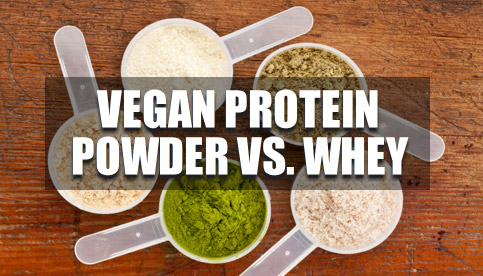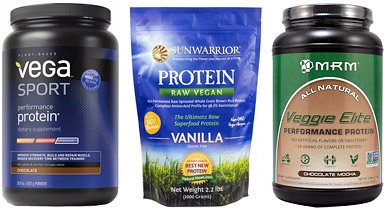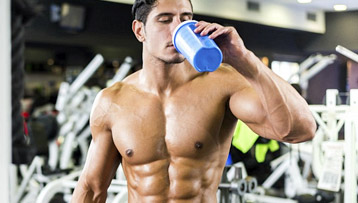VEGAN PROTEIN POWDER VS. WHEY: HOW DO THEY COMPARE?

As a follow up to yesterday’s post discussing vegan bodybuilding diets and their effects on muscle growth, today I wanted to answer one reader’s question who asked for my thoughts on vegan protein powders vs. whey and other animal-based protein supplements.
There are many different types of vegan powders available these days, including pea protein, brown rice, soy, quinoa, potato and hemp, along with products that combine them in various ways.
You might be interested in a vegan protein supplement as a way of hitting your daily protein needs in a more convenient way, or because you experience undesirable side effects from consuming animal-based powders.
But how do these plant-based protein powders compare to animal-based options (such as whey, casein, egg etc.), and are vegan protein powders suitable for a diet aimed at optimizing muscle growth?
Vegan Protein Powder Vs. Whey, Casein Or Egg

The simple answer is that although animal-based protein powders like whey, casein and egg have always been the “go to” sources for most bodybuilders and athletes, vegan substitutes are a perfectly acceptable option as well.
As long as you’re consuming a sufficient amount of protein for the day as a whole and are deriving that protein from a variety of sources (in order to ensure that all of your individual amino acid needs are being met) the specific form of protein powder that you choose just isn’t going to make a noticeable difference to your bottom line muscle building results.
It is true that animal-based powders like whey or casein will have a superior amino acid profile and higher absorption rate in the body on a gram for gram basis in comparison to plant-based sources, but this still won’t make any noticeable impact in the overall picture.
Why?
It’s because as long as you’re taking in enough total protein for the day and are getting that protein from varied sources, you’ll already be receiving more than enough of the absorbable protein and amino acids that are needed to maximize protein synthesis.
Keep in mind that your body can only utilize a limited amount of protein over any given day anyway, and consuming more protein and more amino acids than your body can make use of isn’t going to somehow magically improve your muscle building results.
If you take a look at the research that has been done on protein intake in bodybuilders and athletes (references are at the bottom of this post), the required figures for optimizing muscle growth are a lot lower than most people think.
0.8 grams per pound of body weight daily will easily be enough in most cases, and even a vegan who wants to be fully on the “safe side” (since vegetable proteins are on average less absorbable) still wouldn’t need to exceed 0.9-1.0 grams.
Sure, if for some reason you were in a bizarre scenario where you could only consume 50 grams of protein per day and you needed to make the absolute most of it, whey/egg/casein would certainly be the better choice.
However, if we’re talking about a standard bodybuilding diet that includes sufficient total protein based on your goals, the issue of vegan protein powders vs. whey, casein or egg just isn’t worth worrying about.
Simply eat within that 0.8-1g of protein per pound of body weight daily range and you’ll be getting all the amino acids your body needs for maximum muscle recovery and growth.
There are plenty of vegan protein supplements out there that will deliver just as much protein per scoop as whey and that also taste fine when blended up as part of a complete smoothie.
What is the best vegan protein powder out there?
There isn’t one single product that I would consider the absolute “best”, as there are plenty of acceptable options to choose from.
Much of it will just come down to your individual preference in terms of taste, texture, cost, as well as precisely what you’re looking for in a vegan protein supplement.
Here are a few popular top-selling options I’d suggest checking out…
1) MRM Veggie Elite
2) Sun Warrior Protein
3) S.A.N Raw Fusion
4) Vega Sport Performance Protein
The Bottom Line On Vegan Protein Supplements

Whether you’re following a full blown vegan bodybuilding diet or are simply looking for an alternative to animal-based powders, vegan protein powders are a completely acceptable option to include in your fitness plan.
As long as you’re getting in enough protein for the day as a whole from a variety of different sources, the issue of vegan protein powder vs. whey, egg or casein just isn’t something to worry about.
You can ultimately use any protein powder of your choice to help you meet your protein needs in a more streamlined way, and it just comes down to your individual dietary preference.
If you found this article helpful, make sure to sign up for your FREE custom fitness plan below...

References
Tarnopolsky, M. A., Atkinson, S. A., MacDougall, J. D., Chesley, A., Phillips, S., & Schwarcz, H. P. (1992). Evaluation of protein requirements for trained strength athletes. Journal of Applied Physiology, 73(5), 1986-1995.
Macronutrient content of a hypoenergy diet affects nitrogen retention and muscle function in weight lifters. Walberg JL, Leidy MK, Sturgill DJ, Hinkle DE, Ritchey SJ, Sebolt DR. Int J Sports Med. 1988 Aug;9(4):261-6.
Protein requirements and muscle mass/strength changes during intensive training in novice bodybuilders. Lemon PW, Tarnopolsky MA, MacDougall JD, Atkinson SA. J Appl Physiol. 1992 Aug;73(2):767-75.
Effect of protein intake on strength, body composition and endocrine changes in strength/power athletes. Hoffman JR, Ratamess NA, Kang J, Falvo MJ, Faigenbaum AD. J Int Soc Sports Nutr. 2006 Dec 13;3:12-8.
Effects of exercise on dietary protein requirements. Lemon PW. Int J Sport Nutr. 1998 Dec;8(4):426-47.
Influence of protein intake and training status on nitrogen balance and lean body mass. Tarnopolsky MA, MacDougall JD, Atkinson SA. J Appl Physiol. 1988 Jan;64(1):187-93.
Dietary protein for athletes: From requirements to optimum adaptation. Phillips SM, Van Loon LJ. J Sports Sci. 2011;29 Suppl 1:S29-38.
Macronutrient Intakes as Determinants of Dietary Protein and Amino Acid Adequacy. Millward, DJ. J. Nutr. June 1, 2004 vol. 134 no. 6 1588S-1596S.



